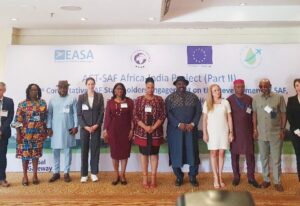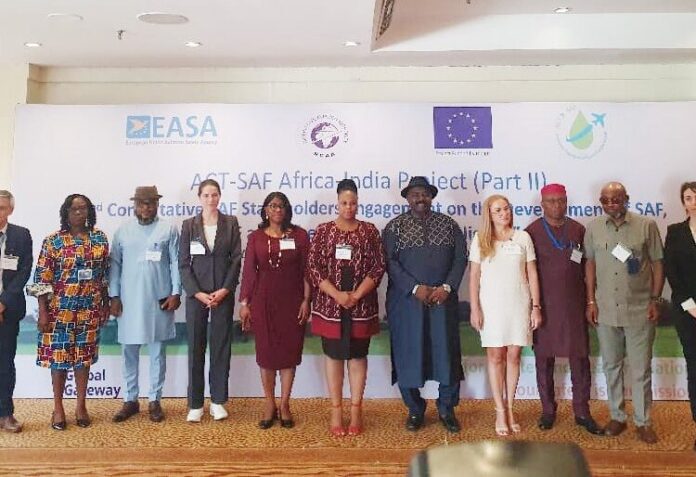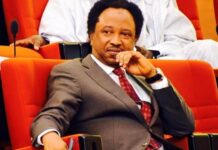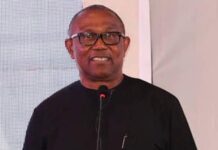In a bid to actualise the reduction in carbon use in aviation fuel in Nigeria, the federal government has engaged stakeholders and international partners to develop Sustainable Aviation Fuel (SAF), Low Carbon Aviation Fuel (LCAF) and other cleaner fuels.
Speaking at the 2nd consultative stakeholders’ engagement on the development and deployment of SAF, LCAF and other cleaner fuels, the Minister of Aviation and Aerospace Development, Festus Keyamo said several technical analyses revealed that sustainable aviation fuel has the greatest potential to reduce emissions from international aviation.
The minister, who was represented by the Director General of the Nigeria Civil Aviation Authority (NCAA), Capt. Chris Najomo further said, “We are forging a strategic partnership that will not only benefit the aviation sector in Nigeria but also contribute to the global efforts toward reducing the carbon footprint of air travel. “The role of international partnerships in this journey cannot be overstated, and we are proud to be working with the European Aviation Safety Agency (EASA) to advance cleaner energy technologies in aviation.

“The aviation sector, through NCAA, is glad to collaborate with the National Council on Climate Change (NCCC) which is the National Designated Authority and official focal point working to address the impacts of climate change in Nigeria.”
Speaking on the reason for the meeting, he said, “This meeting is borne out of the desire for Nigeria to develop a clear roadmap and set targets for the use of cleaner energy in aviation, under the International Civil Aviation Organization (ICAO), resolution on a global framework on aviation cleaner energies.
“This is also, broadly, in line with Strategic Objective number 5 of ICAO to minimise the adverse environmental effects of civil aviation activities. This step is not only laudable, but necessary for our airlines to be able to have competitive operating advantage not just in our sub-region, but in the continent. “This meeting is therefore important, not just for coordination and collaboration among all stakeholders in the aviation and energy sectors, including government agencies, industry players, civil society, academia, and international partners, but also to raise public awareness on the benefits and opportunities of cleaner energy transition for aviation, as well as the challenges and risks of inaction.
“This collaboration is the only way to facilitate the development and deployment of aviation cleaner energies in Nigeria and ensure that the country is not left behind in aviation environmental protection initiatives,” the minister said. He added that the (European Union Aviation Safety Agency) EASA is in the country to assist Nigeria to fast-track the development and deployment of SAF/LCAF and other cleaner energy alternatives for aviation through the SAF Feasibility Study, capacity building, knowledge sharing and the support to build sustainable partnerships between potential feedstock producers, processors, researchers, technology developers, financiers and the end users.
On the availability of cleaner fuels in Nigeria, the minister said, “It is pertinent to state here that Nigeria is blessed with enormous potentials of developing SAF in large quantities and on a sustainable basis, thus, as key players and decision-makers, we should embrace this opportunity to have an in-depth discussion with experts from within the industry and EASA to help chart a clear path for the development and deployment of SAF and LCAF and other cleaner fuels in our nation.
He reaffirmed that the President Bola Tinubu-led government has placed aviation at the centre of its national economic development and is committed to the global agenda of reducing greenhouse gas emissions and transitioning to cleaner energy sources.
“Our nation recognises the potential of SAF, LCAF, and cleaner energy alternatives to not only reduce emissions but also stimulate economic growth, create jobs, and build a resilient energy sector,” Keyamo said.
For his part, the Director General of the National Council on Climate Change, Dr. Nkiruka Maduekwe said although this was the second meeting, he assured that more of it will come considering the government’s commitment to Nigeria to decarbonise her aviation sector which informed the conversation on sustainable aviation fuel, low carbon aviation fuel and other cleaner fuels. “Transport is one of the highest emitters of carbon emission. Should we get it right in our aviation sector, we will get it right in our indices. We cannot make decisions without the stakeholders and that is why we call them to understand what SAF is about and to also make them know what they can do differently.
“They must understand first, and then they would be given alternatives and provide business opportunities and rates. This is where the support from the EU is very important. We have EASA as partners and that is to show that we are mainstreaming SDG 17 in this.”




